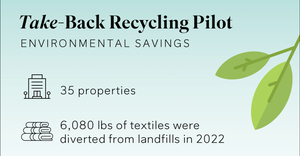
Managing waste and recycling programs is not easy. There are a lot of details to track from the time materials move from collection points to processing facilities on to wherever their final stop may be.
Some stumbling blocks are delayed processes; the inability to know at a given time if recovery targets are being met; and a lack of visibility at each step along the reverse supply chain.
Software company Diversys has developed an app to try and address these issues. There are two main user types for now: Producer responsibility organizations (PROs) who run extended producer responsibility (EPR) programs and government-affiliated stewardships. Though Diversys is in talks with municipalities.
The software tracks metrics around all in-field transactions as well as office transactions.
Here’s how it works: collectors, processors, or remanufacturers log into Diversys remotely via a mobile phone and enter data that’s uploaded to the cloud. That could be information, such as in the case of tires, how many and what type were picked up. It may include how many tires and drop off location (which is validated by GPS). Or with batteries, it could be details like how much acid and metals were extracted; amount of new product derived from components; and whether any components went to landfill or are not accounted for.
In addition to tracking flow of materials this software as a service (SaaS) platform tracks flow of money, verifying for instance how producers’ funds were used and ensuring the information that payments are based on is accurate.
Data can be viewed at the waste and recycling program manager’s office. There are different views for employees, from clerical staff on up to executives, depending on their roles and what they need to see. The administrator will determine who has permission to access information as well as level of access.
Among biggest sells in the eyes of Roger Barlow, Diversys CEO, are that it’s designed for speed and to ensure data integrity.
Diversys performs transactions digitally, making them available in near real-time. There are security checks, log-in authentication, GPS tracking and digital signatures, and it can take digital photos.
Referring to the app as “waste-type and jurisdictionally agnostic,” Barlow says waste streams are managed differently in different jurisdictions, so the software was architected with that in mind.
If managing a plastics program in Ontario, there may be different categories than in another province or state. The software does not restrict users to one set of definitions or categories.
“This flexibility makes it easier for knowing protocol in the field; for inventory management; and reporting,” says Ruth Massey, director of Communications for Diversys.
“We sit with customers to be sure we understand their business needs in order to configure the software for their purposes. EPR and stewardship organizations can get data to show they made their obligations. Cities can use it to inform budget decisions such as how many collection trucks to put on the road or what incentive to pay haulers,” Barlow says.
He said it’s helped waste managers make adaptations in operations when they’ve had to pivot, for instance to manage the barrage of boxes from a spike in online ordering driven by COVID-19.
Mobius PRO Services is a Canadian producer responsibility organization that manages end-of-life tires, electronics, and hazardous special products. It went live with Diversys in March 2021.
“A PRO is basically in the business of creating and selling proof. Proof that end-of-life products were collected, hauled, and processed in compliance with regulations,” says Maury Shnier, founder and president of Mobius PRO Services.
“With this system, the proof is backed with granular, individual transaction-level records that can be quickly verified through our independent assurance audit process. Using Diversys lowers the risks and costs of achieving compliance.”
PROs like Mobius are private organizations carving out a place in a fairly new niche—their business model is practically nonexistent in some parts of North America and fairly new in Canada. They look for a competitive edge, and Barlow is trying to capitalize on that.
“You see businesses operating uniquely to perform transactions to make and save money and capture market share. Diversys gives them the ability to offer something new and different and advantageous to their clients. For example, they can see a dashboard to know at any time how their program is performing, and ultimately make decisions based on that data,” says Barlow.
Barlow illustrates with an example:
In Ontario producers must recycle 85% of the average of the number of tires they put into the market during the preceding three years. With the app they can see where they are at a given time, and if they are behind their obligation they can increase incentives to haulers to collect more. But if they are ahead of their obligation, they can pay less or use excess materials for something else.
Diversys has worked predominantly with tires, used oils, and electronics. Though Barlow says the company is bringing on new clients managing other streams that he can’t announce yet.
As one of the early adopters, Shnier says, “As a PRO, we can’t afford to wonder if we’re tracking to achieving the necessary collection and recovery targets on behalf of our producer clients. Past that, we can’t risk finding out too late that the transactions are not sufficiently verifiable by our auditors.
Our business model is essentially about risk and compliance. Using Diversys lowers those risks as well as costs of achieving compliance.”
About the Author(s)
You May Also Like




